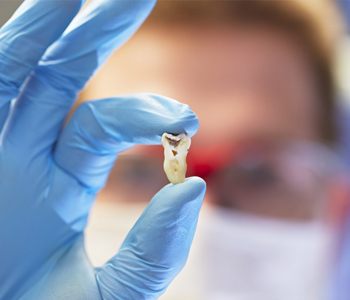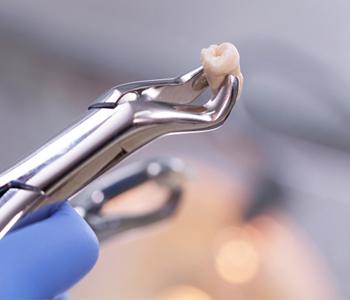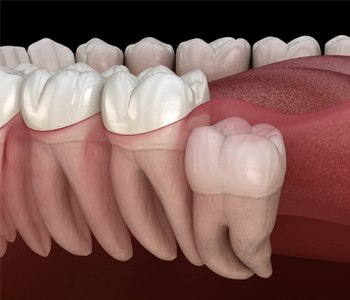
Tooth Extractions
Removing Irreparably Damaged Teeth
Tooth extractions are never a dentist’s first choice; we always strive to save your pearly whites whenever possible, whether it’s with a crown to restore physical damage or root canal therapy to remove an infection. Sometimes, however, teeth have become so damaged that they can’t be repaired and leaving them in could cause further complications. At LuxSmile Family Dentistry of Carrollton, we’ll make sure that the procedure is performed as efficiently and comfortably as possible; Dr. Ton will help you feel at ease during the procedure.
Why Choose LuxSmile Family Dentistry of Carrollton for Tooth Extractions?
- Appointments available during the evening and on Saturday
- Experienced, dedicated dentist
- Full transparency and honesty regarding necessary treatments
When are Tooth Extractions Necessary?

There are a few different reasons why teeth might need to be removed, such as:
- Severe Decay: A cavity can eventually reach the pulp in the center of the tooth, infected it. This can usually be treated with root canal therapy, but for severe infections, an extraction might be necessary to stop it from spreading.
- Periodontal Disease: Gum disease can loosen your teeth; eventually, if enough damage is done, extraction might be the only option.
- Impacted Teeth: If a tooth hasn’t erupted properly, it can damage other teeth and needs to be removed.
- Overcrowded Teeth: If you need orthodontic treatment, overcrowded teeth can sometimes prevent it from working. An extraction can create the space needed for proper realignment to occur.
- Broken Beyond Repair: Crowns, bridges or veneers are the first choice for repairing broken teeth, but if the damage is too extensive, an extraction can be performed.
Tooth Extraction Procedure

For simple extractions, we’ll apply a local anesthetic that numbs the area around the tooth. This way, you won’t experience any pain during the procedure, although you might feel some pressure. An elevator is used to loosen the tooth, and we’ll then remove it using forceps.
Sometimes a surgical extraction (such as for an impacted wisdom tooth) is required instead. After you’ve received necessary forms of anesthetic and sedation, we’ll make a small incision in your gum. A small amount of bone might need to be removed as well. The tooth can sometimes be extracted whole, but in other cases it will be removed in pieces instead.
Wisdom Tooth Extraction

The wisdom teeth – sometimes called the third molars – are the last permanent teeth to erupt, usually between the ages of 17 and 25. In most cases, there’s not enough room in the mouth, so they become impacted. Not only is this very painful, but it can also damage the other teeth or make them more vulnerable to decay. For this reason, it’s usually recommended to have wisdom teeth extracted as soon as possible to avoid future dental problems.
Replacing Your Teeth

Leaving an empty space in your mouth can lead to all kinds of health issues, including drifting teeth and an uneven bite. We’ll examine the state of your oral health and give you a restoration that works for you. In many cases, partial dentures are an excellent option. These are prosthetic teeth attached to a metallic or acrylic base that are held in place by a metal clasp. They’re particularly useful for replacing teeth in the very back or the very front of the mouth.